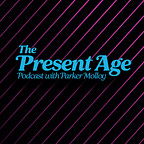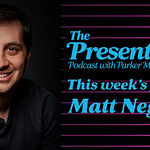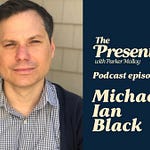On this week’s edition of The Present Age podcast, I chat with writer Thor Benson about some of his recent work covering mental health and the pandemic.
Parker Molloy: Hey, joining me is the Thor Benson. Hello.
Thor Benson: Hi. Thanks for having me.
Yeah. Thanks for taking the time to join the podcast. I am very interested in some of the things you've been writing over at... I read the two pieces you wrote for NBC. Can you tell me a little bit about those and how they work into your larger work basically? Also, let people know who you are.
For sure.
I'm an independent journalist. I've been doing this for about a decade now. Started as a freelancer, have been a freelancer most of the time, but I've had staff jobs here and there. I've written for Daily Atlantic, Rolling Stone, NBC, Business Insider, all kinds of people. And during most of the time I've been writing, psychology has been a pretty big focus of mine, all kinds of science writing and tech writing, and neuroscience also interests me. And when the pandemic started, I was very worried about how it was going to affect people mentally in terms of being quarantined, and isolation is not good for people. It was necessary, of course, because it was God damn pandemic happening.
So I was thinking about that a lot and I started researching it and talking to experts and writing about it here and there and then I connected with an editor at NBC at some point, and we were talking about different ideas or what articles we could do together. And I was like, "I've been really wanting to write this big all-encompassing article about the psychological effects of the pandemic, and I feel like we've been in it long enough now that we can have some observations." So I reached out to a ton of psychologists and finally found some that actually had data and stuff to share about how people are dealing with things, and it's really interesting. And then we parlayed that one into another one about people were being crazy on airplanes, they're still doing it, because of mask rules and I think just from being cooped up with each other and being stressed. And so I did an article about that too.
Well. That's cool. So what kind of stuff did you find when you were talking to these people? Was there anything that surprised you or was it what you expected?
I would say the effects of it were expected, that people would have anxiety and depression and maybe even PTSD from these experiences. What was shocking was how confident everyone I talked to was about if these effects would be long-term and they all seem to think for a lot of people there are going to be long-term effects that won't go away when things go back to, quote-unquote, normal.
Well, that's something that when we were first chatting about this, about doing the podcast, you sent over your articles and I thought this is perfect because my mental health has been absolute shit since the pandemic started. It wasn't great before the pandemic, but that's a different story for a different day. I don't know, there's something about just the whole world having similar issues that make me feel slightly better, but also really worse. It's that weird oh, I'm not alone. Oh no, the whole world is falling apart, that sort of attitude.
Part of the reason I was inspired to write about this and why care about these things is because I've dealt with anxiety and depression in my life, so I get it. And so I wanted to hear what other people have to say about it and what you can maybe do about it. I don't know.
So what can people do about it? Is there anything to keep themselves from stressing out too much?
I could give my personal advice based on what I know of psychology. I think it's good to make sure you're not isolating. Don't constantly be ingesting the news and just try to have some perspective. I feel like things are better now than they were the worst of the pandemic. At least I'm vaccinated now, I can see people and not be so worried.
I don't know about you, but I'm still terrified of catching COVID.
Yeah, I definitely don't want to.
I don't know. I see people post online, Twitter, being like, "Oh, got a breakthrough infection, this sucks." And then there'll be like, "Well, I was really sick for three days, but I didn't go to the hospital." Great. That's good. But also I'm going to do whatever I can to not get sick for three days, just generally speaking. In normal times I'm not going around licking doorknobs or whatever, just being like, "Well, what's the worst I'm going to catch? The flu? Meningitis?" That would be bad, but that sort of idea. And I understand that I'm lucky in a sense that I live with my wife and my dog and my cat, I have not been alone as so many people have been.
And I even begin to imagine how frustrating and bad for my mental health it would be if I were alone. And it's something that I'm trying to understand, trying to understand how we communicate in times where we're apart. And that's one of the general ideas of the newsletter that I'm doing, the podcast, that sort of thing, how we communicate in times of hyper-connectedness where we're not in the same room, we're not in the same city, that sort of thing. And so can you tell me a little bit about what's happening on airplanes?
So I've often been called overly empathetic. When I see people acting this way I'm like these are douchebags, but I feel bad for them because obviously, something's not going right with them. And so I was like, "I'm not going to excuse any behavior, it's wrong to be aggressive on airplanes, but I'd like to figure out if there's maybe a reason they're behaving this way."
Reminder: The Present Age is a reader-supported newsletter. If you enjoy this or other posts, please consider becoming either a free or paid subscriber:
And so I found these two psychologists who had done a lot of research into how the psychological effects the pandemic were playing out in people's behavior and they said that, "Yeah, essentially when the pandemic started, it was really stressful and we didn't know what's going to happen and then it just kept going, and so we just had this acute stress response all the time, chronic stress. And so you're always on alert. You're always a little stressed out, even if you don't notice it. And when that builds up over time, people just start lashing out, especially when things like masks have been so politicized and everyone's it's us versus them. It's not surprising that people, when they're asked to put on a mask or something, if they have these views would get really aggressive maybe in ways that they wouldn't otherwise through a pandemic."
And I understand that to a certain extent. I don't think anyone likes wearing a mask. Some people might not mind it. Personally, I don't mind wearing a mask because I've always worried about how my face looks when I'm in public.
Try having a beard. It looks so weird with the beard.
I like wearing sunglasses too, because I like people not being able to see my eyes. It's very strange, but the combo is perfect. It's basically being totally in disguise. I was thinking back to a few years back, I remember there were some cities responding to protests about... I can't remember what the topic was. I think it might've been Confederate statues possibly. I don't know. It sounds like a thing people protest, but there were some cities around the country they were implementing these rules that banned people from wearing masks for a while, which is funny in hindsight where it's now we're like, "No, no, no, please wear a mask. Please cover your face, please don't let us see who you are." But that's interesting.
And one thing I've also been thinking a lot about when it comes to the pandemic and how we're adapting to all sorts of things, even just on my end, we got a puppy in January 2020, and so it wasn't the plan for us to be constantly around. And now he has these extreme separation anxiety issues where we have to make a point of leaving to try to condition him to be okay with that sort of stuff. And I can't even imagine how that affects people with children or people with their extended family members who need in-person care, that sort of thing. Is there anything that you've been reading about or anything that came up about those sorts of worries or is that beyond—
Well, no, there's definitely been some research into it. I haven't read a time, but as far as I can tell this whole situation has been very traumatic for parents and children. Parents because they're trying to take care of their kid and that's already stressful enough and then you add the pandemic stressors, worried about the kid getting sick and are you getting sick and not being able to take care of the kid. And then for the kids, if they're quite young they don't know why they're putting this thing on their face and they don't really understand something as large in scope as a pandemic and maybe they weren't able to go to school and see their friends. So it's been really tough.
I'm sure. And that brings me a little bit to the other piece you sent me, the one for the new station that was about climate anxiety and declining birth rates. Can you tell me a little bit about that piece?
So I want to say, as I do in the piece, right away that I think the biggest factor in the declining birth rates is economics. It's really expensive and income inequality is bad, but there's also, I believe, some psychological components there. We just have a really uncertain future we're facing, and especially when you're going through a pandemic you think about climate change and you're like, "Things are only going to get worse from here," and that make you less likely to have children or maybe have fewer children. Research seems to show that people are okay with the idea of replacing themselves, but they don't want to go beyond that, so maybe they'll have two kids and a lot of people seem to be worried about if by having kids there'll be contributing to climate change because kids use up resources like we all do.
I don't know. I think the one thing that came out of the pandemic for me is just the fact that I think... Let me see, how do I phrase this? I think the one thing that really hit home when it came to the pandemic, that really stuck with me, is just those existential questions of humanity living... Because for a while, for a long time, I didn't really think about that much and I didn't think anything. I thought oh, a thousand years from now there'll be people doing whatever, but now I'm honestly like, "I don't know, maybe we got 100, 200 years left tops."
These sorts of things that obviously will not personally affect me in the sense that going extinct, but there is that aspect of it where my mind has been blown by these sorts of existential threats to humanity that stick around. And I don't know, one thing I've been thinking a lot about is just the fact that at some point in the future, no matter how famous a person is, there will come a time where no one remembers that person. Whether it's 500 years, 1,000 years from now, and it's just weird and I blame the pandemic for sending me down a philosophical rabbit hole that has ended up there.
Well, I think one of the things that pandemic did to people's minds, and I feel this all the time, is it makes us think about such big things. And it's hard to think about big things all the time. Throughout the day I'm like, "Oh, how our infection rates in France? I'm never looking up health stats in France or Japan or something pre-pandemic, unless I'm working on an article like that. But you constantly have to think globally, and same with climate change, it's we're all screwed kind of feeling. I think your best mentally when you're very focused on just what's around you, I'm walking down the street, I'm going to meet up with my buddy, grab a sandwich on the way. That's very simple and easy to think of, not like the end of humanity.
God, that is something I'm trying to work towards, to be more in the moment rather than thinking about how everything could fall apart. But it's difficult.
It's easy to spiral.
Yeah. One thing with the pandemic that I can't quite get over is just the fact that... I don't know. My one hope for climate change was that hey, there's this big problem we'll come together and solve it. And it seemed maybe a little bit of wishful thinking, but now there's this big problem and we found a way to make it so much worse with the pandemic, people refusing to wear a mask, which is the mildest inconvenience possible, people being asked not to go to Applebee's or something for six months, these things, people were like, "This is tyranny and I will fight it."
And you're just like, "What are you even doing, man? Why?" And I think that part of it comes down to just that there are people who a big part of their personality is they don't like being told what to do, even if it's beneficial for themselves and others. And honestly, if it was just themselves, I wouldn't really care. I would be like, "Fine, make the decisions about your life that are going to affect your life," but when we have 30% of the country that refuses to get vaccinated or refuses to wear a mask, that sort of stuff, it just drags this whole thing on. So I'm worried about climate change and that's something that, while I was certainly worried about before the pandemic, has only gotten more intense. Any word or words of wisdom or anything you've learned along the way on that topic?
To start, I'll say, let me just say, I may or may not be writing an article you'll be very interested in. Secondly, everything's so polarized these days and it infects everything, you would think certain times we could come together and I think we've seen that doesn't seem to be the case.
I'm trying to think of who wrote this thing. There was an article that some conservative dude... Let me just find it. Damn. No, can't find it. I Googled won't get vaccinated because it makes you mad, and it didn't turn up what I wanted to, but it was this conservative dude who wrote an article right when vaccines got made available and was just like, "I'm not opposed to vaccine, but I'm not getting it because it makes you mad," and that's what I want.
Oh, it makes us mad?
Oh yeah, it makes us mad.
I was like you get the injection, suddenly you're raging.
28 Days Later vibe. But it's that “own the libs” ethos.
There are a lot of people on that side of the aisle. It's the “own the lib” thing being contrarian as a personality somehow or... I think a lot of them work at The Daily Wire.
Well, I feel like if I leaned into the contrarian angle on things that I would have significantly more subscribers. Every once in a while I'm just like I should just sell out, I should just start advocating against my own rights and stuff, make bank being like, "Trans people shouldn't be allowed blah, blah, blah." Stuff like that, and there are trans people that do that and they do well for themselves. So I don't know, I guess that speaks to our extremely broken media ecosystem.
Yeah, definitely. You and I both tweet about that a lot.
And that's why when the advice is maybe don't follow the news all the time... When I was at Media Matters, that's what happens. I reached that breaking point where I was like, "I can't watch the news everyday all day.," And then when you get into 2022, it's just going to be non-stop election stuff for the entire year. And then beyond that, once you're past the midterms, it becomes presidential election season. So it's just never going to end.
Right after Biden was inaugurated, they're like, "So is Trump running in 2024?" I was like, "Can we have a moment?"
God, it's so exhausting, but at the same time I feel like it's important. And I feel like the work that we do, the type of journalism that we do, these pieces by you are very important in that regard, they make the world a better place by existing because they help explain the world and your work doesn't sit there and say, "Republicans are morons."
No, that's my Twitter.
But these articles are great and I wish that the stuff that you wrote was as popular as whatever the hell Ben Shapiro's writing today on his blog. And you could pick any day, any day, whatever Ben's writing is probably bad. So that sort of idea.
All I ever see is a little bit of video clips.
He's something else. I'm trying to think. I was going to ask you something, but then I totally forgot. Let's see if it comes back to me.
How's it been going doing the newsletter thing and all that?
Yeah, so doing the newsletter, it's slow going. It's been very gradual, it's steady growth, but I'm not quite where I need to be financially.
For sure.
But that may change. Before I left my job at Media Matters, I made sure that I had a little bit of stability underneath me to hold me over while I tried to build this thing. And so it's been slow going, but I really like the freedom to write about whatever I want and not have to pitch it and not have to make it fit some editors idea of what I should have, but sometimes that results in my pieces just being long and rambling, chaotic for no reason.
I tried to do the newsletter thing and I just couldn't seem to pick a lane. I was just like, "I'm going to share a fiction piece and then I'm going to write about something Republicans are doing." And I was like, "This is not cohesive."
That's another reason that I decided to pick something that was just super broad, communication, that means everything. Everything is communication. Sending emails, communication. Watching TV, sure. That sort of stuff. But I don't know. I'm excited about the future of journalism in that sense, that there are these avenues that are outside of traditional publications. Because I know free freelancing, which was initially my plan, was to freelance, it's just so annoying having to pitch things and to get rejected or to not even hear back. That's always the worst where...
I almost never get a response to my first email, I always have to follow up.
It's so frustrating. And so it finally got to the point where I stopped pitching op-eds to places like New York Times, Washington Post, not Wall Street Journal, they would never do that. But it's these sorts of things where I'm just like, "If someone wants me to write a freelance piece for them, they will reach out and then I will assess it." How's freelancing going?
It's good. So you probably saw I was in Europe for a while. So while I was there I was trying to keep it going but also enjoy the trip. So I was doing half as much work as usual. And so now I've been back for three weeks and had to ramp things up again and things are going well, I'm doing some good freelancing with... I don't know if I'm allowed to say but basically it's someone who I used to work with a lot is bringing me back into the fold.
Well, that's cool. That's cool and cryptic, but is there anything else before we wrap this up? Is there anything else you want to add or where can people find you online, anything you want to plug?
Yeah, just follow me on Twitter, friends, it's Thor underscore Benson B-E-N-S-O-N, Thor like the superhero because everyone thinks it's Thorn for some reason when I say it.
I was debating when I was setting up, I was like, "I should just come prepared with all sorts of questions as though I thought I was scheduling an interview with Chris Hemsworth or something. I'm sure that doesn't get old.
I'm used to it. It's just part of my life.
Cool. Well, that's great. I'll be sure to link to all of your work in the transcript of this. To do that, people can go to readthepresentage.com. Cool. Thanks for stopping by.
Good to be here.















